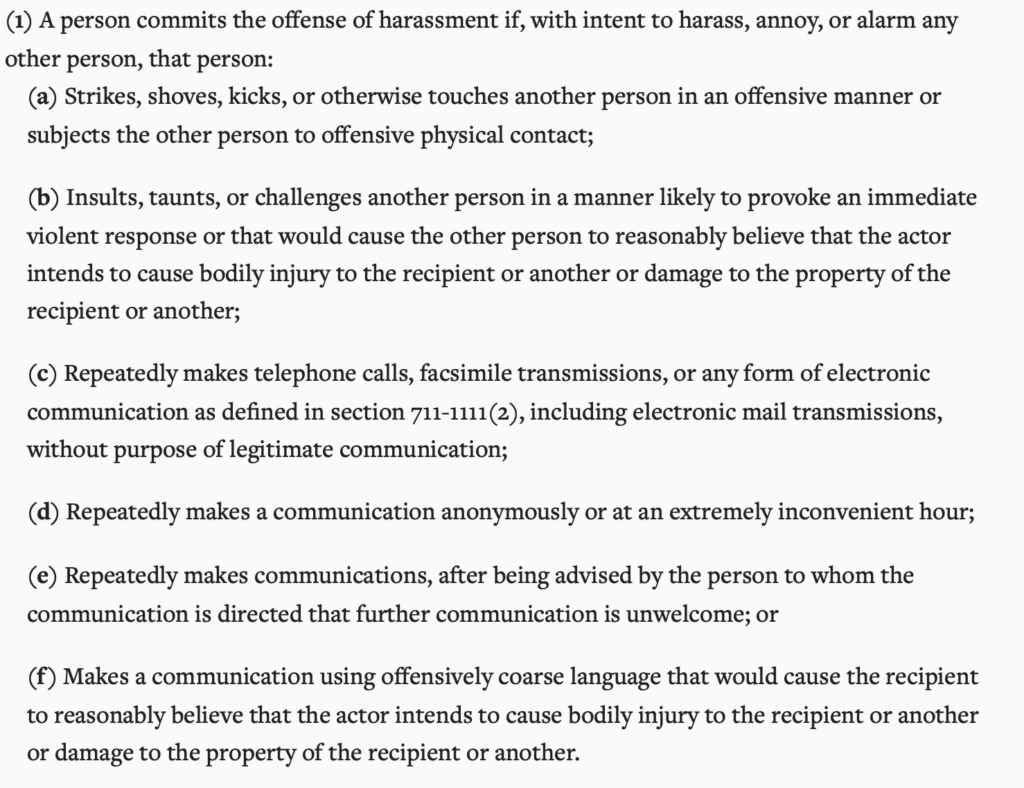Is Doxxing Illegal In Hawaii?
Laura Martisiute
Reading time: 6 minutes

Table of Contents
If you’re an Aloha state resident concerned about online privacy, you may wonder: Is doxxing illegal in Hawaii?
In this guide, we’ll review whether it’s illegal for someone to share your information online without your permission in Hawaii and examine the penalties for doxxing-related crimes.
Is Doxxing Illegal in Hawaii?
No. The act of doxxing, or the unauthorized publication of someone else’s personal information online, is not illegal in Hawaii.
Doxxing Related Activities That Are Illegal in Hawaii
Even though Hawaii doesn’t have an explicit anti-doxxing law, doxing might lead to certain activities that are illegal in the state. These include harassment, stalking, and swatting.
Harassment
In Hawaii, the charge of harassment (Haw. Rev. Stat. § 711-1106) encompasses a wide variety of offenses, including physical violence, verbal insults, repeated phone calls, and repeated communications with someone after being told to stop.

Harassment is a petty misdemeanor in Hawaii, with a penalty of 30 days in jail and a fine of up to $1,000.
Harassment by impersonation
If someone impersonates you without your permission, including transmitting your personal information online, with the intent to harass, annoy, or alarm you, they can be charged with harassment by impersonation (Haw. Rev. Stat. § 711-1106.6) in Hawaii.

Those who commit harassment by impersonation face a misdemeanor charge with a maximum sentence of a year in jail and a fine of up to $2,000.
Harassment by stalking
Hawaii considers it to be harassment by stalking (Haw. Rev. Stat. § 711-1106.5) if someone pursues, surveils, or commits non consensual contact with you on more than one occasion.

Harassment by stalking is a misdemeanor, meaning it comes with up to a year in jail and a $2,000 fine.
Simple trespass
Doxxing can lead to people finding out where you live and work, which can also lead to people trespassing on your property.
In Hawaii, trespassing (Haw. Rev. Stat. § 708-815) is when someone knowingly enters a premises without permission.

If trespassing happens in your house, it’s a misdemeanor bringing with it up to a year in jail and a fine of up to $2,000; if it’s an outdoor enclosure (such as a yard), it’s considered a petty misdemeanor with up to 30 days in jail and a $1,000 fine.
Criminal trespass in the first degree
It’s considered criminal trespass in the first degree (Haw. Rev. Stat. § 708-813) if someone enters a dwelling, hotel, public school, or apartment building without permission and remains there unlawfully or while in possession of a firearm.
Criminal trespass is a misdemeanor with an associated penalty of up to a year in jail and a $2,000 fine.
Extortion
When someone threatens you with bodily harm or says they will publicly expose a secret or information kept in confidence in exchange for some sort of good or service, they are committing extortion (Haw. Rev. Stat. § 707-764).
In Hawaii, it’s considered extortion in the first degree if the amount extorted exceeds $200 in 12 months or involves an extension of credit. In those cases, it’s a Class B felony with up to 10 years in prison and a fine of up to $25,000.
If the amount extorted is between $50-$200, it’s extortion in the second degree, coming with a Class C felony, up to five years in prison, and a fine of up to $5,000.
Without monetary figures involved, extortion in the third degree is a misdemeanor with an associated penalty of up to one year in jail and a fine of $2,000.
Criminal property damage in the first-degree
Intentionally damaging someone else’s property to the tune of $20,000 or more in damages, or to the point that it endangers another person, is considered criminal property damage in the first degree (Haw. Rev. Stat. § 708-820) in Hawaii.

It’s a Class B felony that can result in up to 10 years in prison and a $25,000 fine.
Misuse of 911 emergency telephone service
When someone calls law enforcement or other emergency response services with a fake report about crimes taking place on your property (also known as swatting), it’s considered a misuse of the 911 emergency telephone service (Haw. Rev. Stat. § 710-1014.5) in Hawaii.

Swatting is a misdemeanor with a penalty of up to one year in jail and a $2,000 fine.
Rendering a false alarm
Knowingly raising a false alarm (Haw. Rev. Stat. § 710-1014) to an emergency response service (such as a fire department) is a crime in Hawaii.
It’s a misdemeanor with up to one year in jail and a $2,000 fine.
False reporting to law enforcement authorities
Someone who specifically makes a false report to law enforcement authorities (Haw. Rev. Stat. § 710-1015) in Hawaii can face a misdemeanor charge that can result in up to one year in jail and a $2,000 fine.
Is Doxxing Illegal at the Federal Level?
There is currently no federal law that makes doxxing illegal, in part because doxxing often relies on publicly available information that can be hard to restrict, including your full name, address, phone number, and other contact details.
Many states are enacting their own laws to protect residents against doxxing, including California, Arizona, and Illinois.
Regardless of whether you live in a state where doxxing is illegal or not, you should take steps to protect yourself from being doxxed in the first place since once it happens, it can be difficult to reverse.
To do so, you should make yourself as undoxxable as possible.
How to Protect Yourself Against Doxxing In Hawaii (And Elsewhere)
To protect yourself from being doxxed, you should begin by doxxing yourself (you can do so by following our guide on self-doxxing using these doxxing tools).
Doing so will give you a clear idea of where your personal information appears online and what you should do to remove it.
For most people, this will involve:
- Making social media accounts private to prevent your posts from being seen by the public at large.
- Opting out of data brokers, as they are often the first stop for bad actors looking to acquire information. You’ll need to opt out of every major data broker with a profile on you and repeat the process, as data brokers notoriously reactivate profiles when new information comes up. Alternatively, you can subscribe to a data broker removal service such as DeleteMe to handle the opt-out process for you.
- Creating and using unique usernames to prevent bad actors from following you between platforms and gaining more information about you (here’s how someone could doxx you on Instagram).
- Using strong passwords and multi-factor authentication to prevent your accounts from being accessed by bad actors.
- Limiting the amount of personal information you share online.
Want to learn more? Check out our guide on how to prevent doxxing.
Our privacy advisors:
- Continuously find and remove your sensitive data online
- Stop companies from selling your data – all year long
- Have removed 35M+ records
of personal data from the web
Save 10% on any individual and
family privacy plan
with code: BLOG10
news?
Don’t have the time?
DeleteMe is our premium privacy service that removes you from more than 750 data brokers like Whitepages, Spokeo, BeenVerified, plus many more.
Save 10% on DeleteMe when you use the code BLOG10.
















